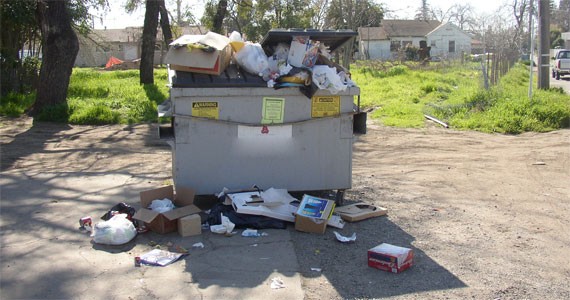Food. We know the discussion. Local vs. imported. Organic vs. conventionally grown. These polarities quickly define the intellectual landscape. Local and organic is clearly better than imported, conventionally grown.
But if that isn't available (or out of your price range), what then? The vagaries quickly take over and we're left buying what looks good and is affordable. Such is the dilemma of food ethics.
But what if we reframed the conversation? In a society where food is commodified, it becomes less about nutrition and sustenance and more about aesthetics and trends. We cannot, however, buy what is not being sold, and so much food is thrown out as soon as it is deemed unsellable.
Instead of voting exclusively with our wallets, what if we voted with our mouths and refused to let food go to waste? An ethic of non-waste---an ethic of food reclamation. Food is food is food, and there are a lot of hungry people.
A 2011 study by the United Nations Food and Agriculture Organization, "Global Food Losses and Food Waste," found that one-third of all food produced globally for human consumption is lost or wasted. The "lost" category is largely caused by poor supply chains and a lack or storage or cooling, especially in developing countries.
In North America we should be more personally concerned with the "waste" category. "In medium- and high-income countries food is to a great extent wasted, meaning that it is thrown away even if it is still suitable for human consumption," says the UN study.
While we might not be able to immediately effect the supply chains that contribute to a significant loss and waste of food in Atlantic Canada, we can start by looking at our local waste.
Of special note to high-income countries like Canada was a suggestion that we stop buying more food than we can eat before it goes bad. The UN study estimates that "the per capita food waste by consumers in Europe and North America is 95-115 kg/year, while this figure in Sub-Saharan Africa and South/Southeast Asia is only 6-11 kg/year," amounting to approximately 100 million kilograms wasted in Nova Scotia every year.
We also have the issue of waste from our food vendors---markets, corner stores and the large grocery stores. An odd shape or colour of a vegetable often results in rote disposal, even if there is no compromise of taste or nutrition. A spot of 'old' on anything will almost always mark it for the dumpster. Even without any visible "defect," our grocery stores follow the suggested best-before dates. This even extends to foods like honey, which has been recovered in safe and edible condition from ancient Egypt---more then 2,000 years old. Why does honey have an expiry date? Why should it be destroyed when it reaches that arbitrary date? If you could see what is being tossed by these stores, you would find dumpsers full of edible produce, bread, grains and other foods.
This waste isn't just a failure of regulation or will on the part of the grocery stores. It's a failure of creativity to better our society.
Feed Nova Scotia distributes about two million kg of food annually. That supply has been stretched thin over the last few years, with a 33 percent increase in people seeking services from 2008 to 2011. If even a fraction of the edible food currently wasted was redirected, we would be living in a province that looks after each other much, much better. Better not just in terms of those living in hunger but in how we creatively, practically, and collectively solve our societal problems.
So, what's stopping us from using this food from grocery stores? It could be because Nova Scotia's laws don't offer any protection from liability for giving this food away. In 1994, Ontario passed the Donation of Food Act to protect businesses and their employees from liability when donating food. This should be done in Nova Scotia, removing the most obvious obstruction for companies that would genuinely like to help.
We should also go one step further and protect companies from possible injuries associated with dumpster diving. While it would be best to have this food distributed in an organized manner, making sure it is available to those who need it is most important, even if that looks like a broke student hopping into a dumpster to get his groceries.
This additional law would also add an incentive for the grocery stores to give the food away to an organization to avoid the willy-nilly dumpster diving. The understanding here is that if a grocery store had no legitimate legal reason to dispose of perfectly good food then we just might not see it happen so much.
And what if the city hired a Food Reclamation Officer? Her mandate could be to connect the dots between stores and restaurants with excess food and community organizations that could distribute it. The position could be funded by savings on waste removal. We are already paying taxes for programs that help to feed people. Why spend the money buying food when we could take advantage of this forgotten food resource?
Changing our individual consumption patterns is more controllable, but will not change the underlying shortcomings. While government regulation and lawmaking may seem attractive, ultimately, there is no villain in this situation. There are just innumerable individual consumers, businesses and government entities working within their own scopes.
But still, are we---personally and as a community---behaving responsibly? Are we satisfied that enough food is reaching most tables? How do we feel about waste itself?
Regardless of the geographic origins or growing methods, this food is wasted. The nutrition of it, wasted. The fossil fuels to produce and transport it, wasted. All wasted.
Byron Wild and Nyima Wimberly are Dalhousie students who have spent the past six months dumpster diving.

